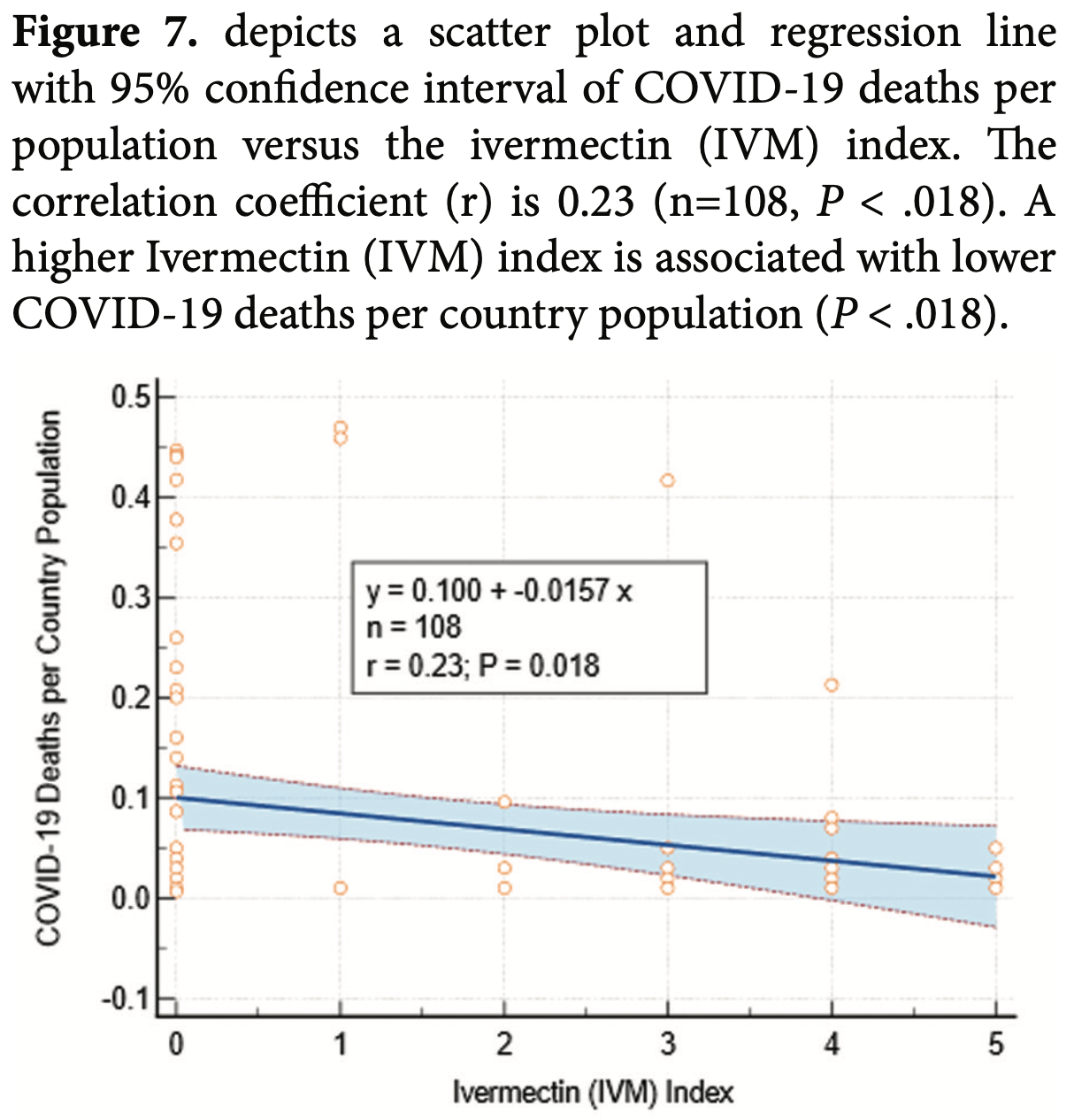
Global COVID-19 Pandemic Outcomes: A Cross-Country Comparison Study of Policy Strategies
Thorp et al., Integrative Medicine, 23:2, May 2024
https://c19ivm.org/thorp.html
Retrospective study of 108 countries showing negative correlations between hydroxychloroquine/ivermectin use and mortality. Higher ivermectin index scores (r=-0.23, p=0.018) and hydroxychloroquine index scores (r=-0.15, p=0.125) were correlated with lower mortality. The study also found positive correlations between mortality and healthcare expenditure, income levels, testing rates, vaccination, and stringency of containment measures. Authors note limitations in data reliability and consistency across countries. The results challenge the efficacy of common pandemic management strategies and suggest potential benefits of early treatment with hydroxychloroquine/ivermectin.
Study covers ivermectin and
HCQ.
Thorp et al., 31 May 2024, retrospective, peer-reviewed, 5 authors.
Abstract: This article is protected by copyright. To share or copy this article, please visit copyright.com. Use ISSN#1945-7081. To subscribe, visit imjournal.com
REVIEW ARTICLE
Global COVID-19 Pandemic Outcomes: A Cross-Country
Comparison Study of Policy Strategies
James A. Thorp, MD; Margery M. Thorp, JD, MACP; Elise M. Thorp, BS, FNTP;
Ajovi Scott-Emuakpor, MD, PhD; K.E. Thorp, MD
Abstract
This paper explores global COVID-19 treatment and
containment strategies in 108 countries worldwide,
specifically the correlation between COVID-19 deaths
and the countries’ vaccination rates. Comparison of data
across states, provinces, territories, and countries relied
upon a common method to evaluate data regarding the
impact of COVID-19 policies in the last three years.
Data from nine different databases were analyzed
to determine if there were correlations between
the percentage of countrywide COVID-19 deaths/
population and countries’ percent vaccinated. Secondary
outcome measures include the effect of other variables
on COVID-19 death rates per country population,
including health expenditures and annual income per
capita, COVID-19 tests per 1000 people, stringency
index (a measure of each country’s containment
strategies), hydroxychloroquine/ivermectin scores
(measure country use), hypertension, obesity, diabetes,
and geographic locations. COVID-19 vaccination rates
James A Thorp, MD; Chief of Maternal and Pre-Natal Health,
The Wellness Company, Gulf Breeze, FL. Margery M. Thorp,
JD, MACP; Law Firm of Margery M. Thorp, PLLC, Gulf
Breeze, FL. Elise M. Thorp, BS, FNTP; Williamston, MI. Ajovi
Scott-Emuakpor, MD, PhD; Dept. of Pediatrics & Human
Development, College of Human Medicine, Michigan State
University, East Lansing MI. K.E. Thorp, MD; Department of
Radiology, Sparrow Health System, Lansing, MI.
Corresponding author: James A. Thorp, MD
E-mail address: jathorp@bellsouth.net
Please send us corrections, updates, or comments.
c19early involves the extraction of 200,000+ datapoints from
thousands of papers.
Community updates
help ensure high accuracy.
Treatments and other interventions are complementary.
All practical, effective, and safe
means should be used based on risk/benefit analysis.
No treatment or intervention is 100% available and effective for all current
and future variants.
We do not provide medical advice. Before taking any medication,
consult a qualified physician who can provide personalized advice and details
of risks and benefits based on your medical history and situation.
IMA and
WCH
provide treatment protocols.
Submit
